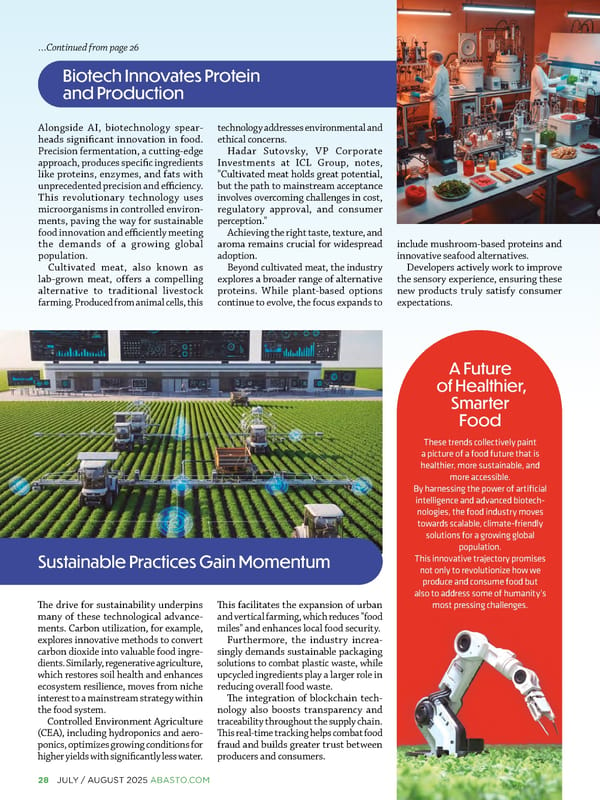28 JULY / AUGUST 2025 ABASTO.COM Alongside AI, biotechnology spear- heads significant innovation in food. Precision fermentation, a cutting-edge approach, produces specific ingredients like proteins, enzymes, and fats with unprecedented precision and efficiency. This revolutionary technology uses microorganisms in controlled environ- ments, paving the way for sustainable food innovation and efficiently meeting the demands of a growing global population. Cultivated meat, also known as lab-grown meat, offers a compelling alternative to traditional livestock farming. Produced from animal cells, this technology addresses environmental and ethical concerns. Hadar Sutovsky, VP Corporate Investments at ICL Group, notes, "Cultivated meat holds great potential, but the path to mainstream acceptance involves overcoming challenges in cost, regulatory approval, and consumer perception." Achieving the right taste, texture, and aroma remains crucial for widespread adoption. Beyond cultivated meat, the industry explores a broader range of alternative proteins. While plant-based options continue to evolve, the focus expands to Biotech Innovates Protein and Production include mushroom-based proteins and innovative seafood alternatives. Developers actively work to improve the sensory experience, ensuring these new products truly satisfy consumer expectations. The drive for sustainability underpins many of these technological advance- ments. Carbon utilization, for example, explores innovative methods to convert carbon dioxide into valuable food ingre- dients. Similarly, regenerative agriculture, which restores soil health and enhances ecosystem resilience, moves from niche interest to a mainstream strategy within the food system. Controlled Environment Agriculture (CEA), including hydroponics and aero- ponics, optimizes growing conditions for higher yields with significantly less water. This facilitates the expansion of urban and vertical farming, which reduces "food miles" and enhances local food security. Furthermore, the industry increa- singly demands sustainable packaging solutions to combat plastic waste, while upcycled ingredients play a larger role in reducing overall food waste. The integration of blockchain tech- nology also boosts transparency and traceability throughout the supply chain. This real-time tracking helps combat food fraud and builds greater trust between producers and consumers. A Future of Healthier, Smarter Food These trends collectively paint a picture of a food future that is healthier, more sustainable, and more accessible. By harnessing the power of artificial intelligence and advanced biotech- nologies, the food industry moves towards scalable, climate-friendly solutions for a growing global population. This innovative trajectory promises not only to revolutionize how we produce and consume food but also to address some of humanity's most pressing challenges. Sustainable Practices Gain Momentum …Continued from page 26
 Abasto Magazine: July / August 2025 - ENGLISH Page 27 Page 29
Abasto Magazine: July / August 2025 - ENGLISH Page 27 Page 29